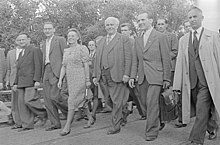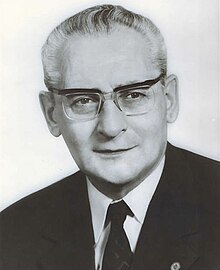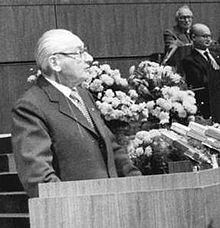Paul Verner
Paul Verner (born April 26, 1911 in Chemnitz , † December 12, 1986 in East Berlin ) was a member of the Politburo of the Central Committee of the SED in the GDR and deputy chairman of the State Council of the GDR .
Life
family
Paul Verner was born the son of Wenzel Verner (1887–1938), a metal worker and co-founder of the KPD in Chemnitz , and his wife Anna, who was also a communist. His younger brother was Waldemar Verner (1914–1982), an officer in the People's Navy of the National People's Army of the GDR , most recently Deputy Minister for National Defense of the GDR with the rank of admiral .
youth
Verner completed an apprenticeship as a machine fitter. He was active in communist youth work, became a member of the Communist Youth Association of Germany in 1925 and of the KPD in 1929 and was then a youth functionary. From 1932 he was a correspondent for the magazine “ Komsomolskaya Prawda ” in Moscow , from the end of 1933 in the Scandinavian office of the Communist Youth International editor of the “Jugendinternationale” and from 1934 editor of the “Young Guard” in Paris . Via the Netherlands and Belgium he came to Spain in 1936 , where he was active in the Spanish Civil War as an assistant to the war command of the 15th International Brigade and editor of "El Voluntaria" . In 1939 he went to Sweden on behalf of the party . There he was arrested and was first interned in Smedsbo from 1940 to 1942 and then imprisoned in prison. From 1943 he worked as a metal worker.

Post war
After his return to Germany in 1946, he was editor-in-chief at the Neues Leben publishing house . He joined the SED, where he was responsible for youth issues on the party executive committee, and was a co-founder of the FDJ and a member of its central council.
In 1949 he was the head of the organization department at the Central Committee of the SED . From 1950 he was a member of the Central Committee, until 1953 as secretary for all-German questions and until 1958 as head of the department for all-German questions, in this position responsible for conspiratorial work in the Federal Republic.
In 1958 he became a candidate and in 1963 a member of the Politburo of the Central Committee of the SED . From 1959 to 1971 he was the first secretary of the SED district leadership in Berlin. From 1958 he was also a member of the People's Chamber , and from 1963 to 1971 city councilor of Berlin. In 1971 he became a member of the State Council and chairman of the People's Chamber Committee for National Security and Central Committee Secretary for Security. From 1971 to 1983 he was head of the youth commission at the Politburo of the Central Committee of the SED, from 1972 to 1976 a member of the commission for the revision of the SED statute and from 1981 deputy chairman of the State Council .
Retirement
In 1984 he resigned from all offices for health reasons. After his death on December 12, 1986, his urn was buried in the Socialist Memorial at the Friedrichsfelde Central Cemetery in Berlin-Lichtenberg .
Honors
On May 6, 1955, Verner received the Patriotic Order of Merit in silver, in 1961 also the Patriotic Order of Merit, in 1969 and 1976 the Karl Marx Order , in 1971 the plaque for the Patriotic Order of Merit and in 1986 the Great Star of Friendship of Nations .
The Berlin underground station Louis-Lewin-Straße was named Paul-Verner-Straße from 1989 to 1991 ; also an adjacent street.
Others
- In his song “That makes me popular”, Wolf Biermann wrote about Verner: “Why the gods just punished Berlin / With Paule Verner / I don't know. The governor / recently had me arrested /… / That's the whole Verner Paul: / A sparrow's brain with a snapdragon / The Lord makes it difficult for himself / He makes me popular /… ”. (Published 1974)
- His younger brother Waldemar Verner (1914–1982) was Deputy Minister for National Defense and Head of the Main Political Administration in the GDR with the rank of Admiral from 1959 to 1978.
- An independent unit of the National People's Army, the BFEK-5 , special news unit of the Northern Military District, Jellen near Goldberg, was given his name on February 28, 1989 as a name of honor.
Fonts
- For the good of the working class and the whole people. Selected speeches and essays. Dietz-Verlag, Berlin 1976
- On the tried and tested course for socialism and peace. Selected speeches and essays. Dietz-Verlag, Berlin 1981
Individual evidence
- ^ Hermann Weber , Andreas Herbst (ed.): German communists . Biographisches Handbuch 1918 to 1945. 2nd, revised and greatly expanded edition. Dietz, Berlin 2008, ISBN 978-3-320-02130-6 ( Online: Wenzel Verner ).
- ↑ Comrade General !: the military elite of the GDR in biographical sketches , Hans Gotthard Ehlert, Armin Wagner, p. 306, Christoph Links Verlag, 2003, ISBN 3-86153-312-X
- ↑ Scandinavian experiences desired ?, Post exile and remigration , Michael F. Scholz, p. 109, Franz Steiner Verlag Stuttgart, 2000, ISBN 3-515-07651-4
literature
- Michael F. Scholz : Verner, Paul . In: Who was who in the GDR? 5th edition. Volume 2. Ch. Links, Berlin 2010, ISBN 978-3-86153-561-4 .
Web links
- Literature by and about Paul Verner in the catalog of the German National Library
| personal data | |
|---|---|
| SURNAME | Verner, Paul |
| BRIEF DESCRIPTION | German politician (SED), MdV, member of the Politburo of the Central Committee of the SED in the GDR |
| DATE OF BIRTH | April 26, 1911 |
| PLACE OF BIRTH | Chemnitz |
| DATE OF DEATH | December 12, 1986 |
| Place of death | East Berlin |



